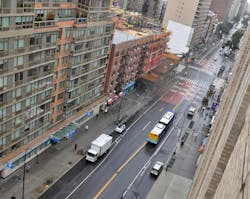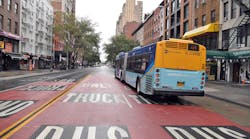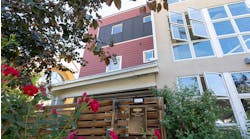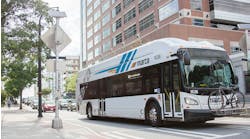Nine major bus lane projects to help give New Yorkers safe, reliable and fast public transit options was announced by New York City Mayor Bill de Blasio as the city begins its phased reopening.
The new busways and dedicated bus lanes will increase bus speeds and reliability along major corridors in all five boroughs and address concerns over the growth in vehicular traffic.
“As New Yorkers head back to work, they’ll be relying on the bus more than ever – and I’m proud to offer them faster and more reliable options,” said Mayor de Blasio. “By replicating the 14th Street success story in other congested corridors, we can reduce traffic, increase mass transit service and build a fairer and better New York.”
After a successful pilot last October, the popular 14th Street busway will be made permanent and bus lanes extended eastward. The city will also add a bus and truck priority treatment along Flushing’s Main Street in Queens, and new bus lanes to serve critical transit connections along 149th Street in the Bronx. The nine projects combined will benefit nearly 750,000 daily riders.
“As New York City emerges from the difficult days of COVID-19, our commitment to faster and more reliable bus service has never been more important, as buses serve a critical role both in communities hit hard from the pandemic and by essential front-line workers,” said New York City Department of Transportation (DOT) Commissioner Polly Trottenberg. “We are proud to undertake transformational work on some of the busiest bus corridors in the city, including 149th Street in the Bronx and on 14th Street in Manhattan, where the busway has been such a tremendous success. We look forward to working with our partners at the MTA to get these transformational changes finished this year.”
Projects beginning this month include:
- 149th Street, Bronx: New York City DOT will implement offset bus lanes for most of the 2.7-mile corridor from Southern Boulevard to River Avenue. 149th Street carries four bus routes with a total of 55,000 daily riders, and serves as a vital connection to 10 subway lines, the HUB and Lincoln Medical Center.
- The 14th Street Busway, Manhattan: The 14th Street Busway pilot has received international attention, as it has successfully increased bus speeds by as much as 24 percent and ridership by as much as 30 percent. The city will make this pilot project permanent. The project, which serves approximately 28,000 daily riders of the M14, combines blocks of exclusive access and standard bus lanes to provide bus priority from 9th Avenue to 1st Avenue. New York City DOT will add 0.8 miles of new bus lane from 1st Avenue to Avenue C.
- Main Street, Flushing: New York City DOT will add a busway to a .3-mile northbound stretch of Main Street, where it meets the terminus of the 7 train. The street currently features bus and truck priority treatments in the southbound direction that have resulted in a 23 percent increase in bus speeds between 2017 and 2018. The enhancement will run along Main Street and Kissena Boulevard as it connects to Main Street and will continue to Northern Boulevard. Bus routes that travel along Main Street carry about 150,000 rides per day.
New York City DOT, in collaboration with Metropolitan Transportation Authority, also announced that it will implement bus priority improvements on seven additional corridors in 2020, including bus lane or busway treatments at the following locations.
Busways:
- Main Street in Queens
- Jamaica Avenue in Queens
- 5th Avenue in Manhattan
- Jay Street in Brooklyn
- 181st Street in Manhattan
Bus lane projects:
- 14th Street in Manhattan (from 1st Avenue to Avenue C)
- 149th Street in the Bronx
- Merrick Boulevard in Queens
- Hylan Boulevard in Staten Island
New York City DOT says it will engage with stakeholders on an ongoing basis to address issues in affected communities and will give bus priority to these corridors this year:



